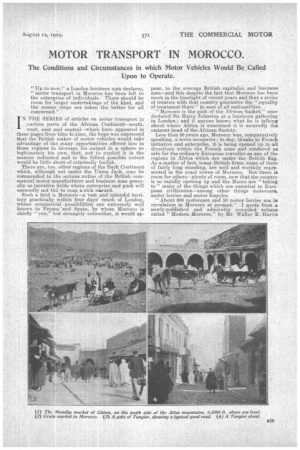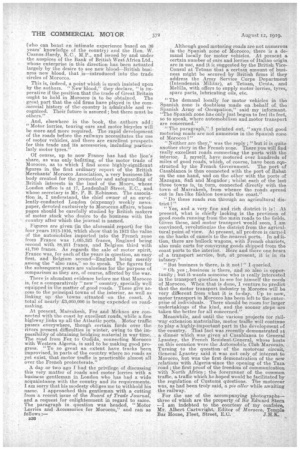MOTOR TRANSPORT IN MOROCCO.
Page 13

Page 14

If you've noticed an error in this article please click here to report it so we can fix it.
The Conditions and Circumstances in which Motor Vehicles Would Be Called Upon to Operate.
" Up to now," a London :business man declares, "motor transport in Morocco has been left to the enterprise of individuals. There should be room for larger undertakings of, the kind, and the sooner steps are taken the better for all concerned."
IN THE SERIES of articles on motor transport in , various parts of the African Continent—south, . west, east and central—which have appeared in these pages from tifne to time, the hope was expressed that the British maker of motor vehicles would take advantage of the many opportunities offered him in those regions to increase his output in a sphere so legitimately his own, that, not to exploit it in the manner indicated and to the fullest possible extent would be little short of criminally foolish.
There are, too, other regions of the Dark Continent which, although not under the Union Jack, may be commended to the serious notice of the British commercial motor manufacturer and business man generally as lucrative fields where enterprise arid push will assuredly not fail to reap a rich ra.ward.
Such a field is Morocco—a vast and splendid territory practically Within four days' reach of London, whose commercial possibilities are extremely well known to France and Spain, by whom Morocco is chiefly " run," but strangely unfamiliar, it would ap
pear,.to the average British capitalist and business man---Land this despite the fact that Morocco has been much in the limelight of recent years and that a series of treaties with that country guarantee the " equality of treatment there" to men of all nationalities. . • "Morocco is the pick of the African basket," once declared Sir Harry Johnston at a luncheon gathering in London; and if anyone knows what he is talking about where Africa is concerned it is assuredly the eminent head of the African Society.
Less than 20 years ago, Morocco was, comparatively speaking, a terra ineorita,; to-day, thanks to French initiative and enterprise, it is being opened up in all directions within the French zone and rendered as safe for the ordinary European traveller as any of the regions in Africa which are under the • British flag. As a matter of fact, many British firms, some of them of fairly long standing, are well and worthily repro.s•e,nted in the coast towns -of Morocco. But there is room for others—plenty of room_, now that the country is so rapidly opening up and the Moors are "taking to" many of the things which are essential to European civilization—among other things motorcars, motor lorries and motor bicycles.
"About 600 motorcars and 50 motor lorries arR in circulation in Morocco at present." 1 quote from a newly-published and admirably compiled volume called Modern Moroceo," by Mr. Walter B. Harris
(who can boast an intimate experience based on 30 years' knowledge of the country) and the Hon. W. Cozens-Hardy, KC., M.P., and issued by and under the auspices of the Bank of British West Africa Ltd., whose enterprise in this direction has been actuated largely by the desire to see new blood—British business new blood, that is—introduced into the trade circles of Morocco.
This is, indeed, a point which is much insisted upon by the authors. " New blood," they declare, "is irnperative if the position that the trade of Great Britain ought to hold in Morocco is to be obtained. The great part that the old firms have played in the commercial history of thecountry is admirable and recognized. Their future is assured ; but there must be others."
And, elsewhere in the book, the authors add : "Motor lorries, touring cars and motor bicycles will be more and more required. The rapid development of the roads before the railways necessitates the use of motor vehicles, and there are excellent prospects for this trade and its accessories, including particularly motor tyres."
Of course, up to now France has had the lion's share, as was only befitting, of the motor trade of Morocco, as to which I find some highly-significant figures in. the first ordinary report of the British Merchants' Morocco Association, a very business-like body created for the promotion and safeguarding of British interests in the land of the Moors, whose London office is .at 17, Leadenhall Street, E.C., and whose secretary is Mr. P. B. Robinson. The association is, I understand, the chief owner of an expellently-conducted London (sixpenny) weekly newspaper, devoted exclusively to Moroccan affairs, whose pages should be carefully studied by British makers of motor stock who desire to do business with the country after which the journal is named.
Figures are given -(in the aforesaid report) for the four years 1913_1916, ivhich show that in 1913 the value of the automobiles imported into the French zone from France was 1,465,323 -francs, England being second with 88,251 francs, and Belgium third with 41,790 francs. As regards the sale of motor spirit, France was, for each of the years in question, an easy first, and Belgium second—England being merely among the "also tans," so to. sneak. The figures for the subsequent years are valueless for the purpose of comparison as they are, of course, affected by the war.
There is abundant evidence before me that Morocco is, for a comparatively " new " country, specially well equipped in the matter of good roads. These give access to the principal towns of the interior, as well as linking up the towns situated on the coast. A total of nearly 23,000,000 is being expended on roadmaking.
At present, Marrakesh, Fez and Meknes are connected with the coast by excellent roads, while a fine highway links up all the Atlantic ports. Motor traffic passes everywhere, though certain fords over the rivers present difficulties in winter, owing to the impossibility of obtaining bridging material in war time. The road from Fez to Oudjda, connecting Morocco with Western Algeria, is said to be making good progress. "To so great an extent have tracks been improvised, in parts of the country where no roads as yet exist, that motor traffic is practicable almost all over the French protectorate."
A day or two ago I had the privilege of discussing this very matter of roads and motor lorries with a busiaess gentleman in London who has had a wide acquaintance with the country and its requirements. I am sorry that his modesty obliges me to withhold his name. I approached this gentleman with a cutting from a recent issue of the .Board of Trade Journal, and a request for enlightenment in regard to same. The paragraph in question was headed, "Motor Lorries and Accessories for Morocco," and ran as follows :—
B36
Although good motoring roads are not numerous in the Spanish zone of Morocco, there is a demand locally for motor vehicles. At presenta certain number of cars and lorries of Italian origin are in use, and it is suggested by the British ViceConsul at Tetuan that a certain amount of business might be secured by British firms if they address the Army Service Corps Department (Intendencia Militar), at Tetuan, Ceuta, and Melilla, with offers to supply motor lorries, tyres, spare parts, lubricating oils, etc.
"The demand locally for motor vehicles in the Spanish zone is doubtless made on _behalf of the
Spanish Army of Occupation," said my informant. "The Spanish zone has only just begun to feel its feet, so to speak, where automobilism and motor transport are concerned."
"The paragraph," I pointed out, "says that good motoring roads are not numerous in the Spanish zone of Morocco?"
"Neither are they," was the reply ; "but it is quite another story in the French zone. There you will find • really excellent roads connecting the ports with the interior. 1, myself, have motored over hundreds of
miles of good roads, which, of course, have been cqn struated by the French Government. The port of Casablanca is thus connected with the port of Rabat
on the one hand, and on the other with the ports of Ma.zagan, Safi and Mogador ; whilst each of the last three towns is, in turn, connected directly with the town of Marrakesh., from whence the roads spread out in fan-like fiishion towards the coast."
"Do these roads run through an agricultural district 1 " "Yes, and a very fine and rich district it is ! At present, what is chiefly lacking is the provision of good roads running from the main roads to the fields.
Given these, and motor transport would soon, I am convinced, revolutionize the district from the agricul tural point of view. At present, all produce is carried on the backs of camels to the nearest ports. In mill-Lion, there are bullock wagons, with French chariots,
also mule carts for conveying goods shipped from the coast ports to the interior. Here and there one hears of a transport service, but, at ,present, it is in its infancy."
"But business is there, is it not?" I queried.
Oh yes ;..business is there, and so also is -opportunity ; but it wants someone who is ieally interested in the transport question to see for himself the needs of Morocco. When that is done, I venture to predict that the motor transport industry in Morocco will be very different from what it is to-day. rp to now, motor transport in Morocco has been left to the enterprise of individuals. There should be room for larger undertakings of the kind, and the sooner steps are taken the better for all concerned."
Meanwhile, and until the various projects tor rail'way extension materialize, -motor traffic will continue to play a highly-important part in the development of the country. That fact was recently demonstrated at a. dinner which was given at Casablanca to General Lyautey, the French Resident-General, whose hosts on this occasion were the Automobile Club Marocain.
Turning to the question of ' the motorcar circuit, General Lyautey said it was not only of interest to
Morocco, -but was the first demonstration of the new
relations with Algeria-since the opening of the Taza road ; the first proof of the freedom of communication
with North Airmen; the forerunner of the common traffic, a traffic which he hoped would be facilitated by the regulation of -Customs qifestiona. The motorcar was, as had been truly said, a pis aller while awaiting the railway.
For the use of the accompanying photographs— three of which are the property of Sir Edward Stern —1 am indebted to the courtesy of my confrere, Mr. Albert Cartwright, Editor of Morocco Temple Bar House, Fleet, Street, E.G. Morocco,
























